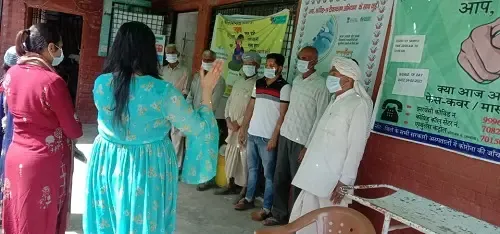Is the Cholera Outbreak in Congo Reaching a Critical Point?

Synopsis
Key Takeaways
- Cholera cases have surged in the DRC, affecting 17 provinces.
- Current infections exceed 35,000 since the year began.
- The acute phase indicates an ongoing rise in cases.
- Tshopo province is the most impacted area.
- 80% of fatalities occur before patients reach hospitals.
Kinshasa, July 15 (NationPress) The Democratic Republic of the Congo (DRC) is experiencing a significant resurgence of cholera, with cases reported across 17 of its 36 provinces and over 35,000 infections documented since the start of the year, according to authorities on Tuesday.
Public Health Minister Roger Kamba informed a briefing in Kinshasa, the capital, that the nation remains in the "acute phase" of this outbreak.
"Being in the acute phase indicates that we are still witnessing an increase in cases," Kamba stated.
This outbreak, which has remained endemic in several eastern provinces since its initial appearance over 50 years ago, is now spreading rapidly, particularly in Kinshasa, a city housing over 17 million residents.
"Cholera was first introduced to our nation in 1973, and since then, it has never truly vanished. It has primarily remained in the eastern regions," remarked the minister.
"Occasionally, the disease resurfaces as an epidemic. More frequently, it is endemic—indicating a persistent presence of cases in certain areas, albeit quickly contained," Kamba explained. “However, there are times it leads to substantial outbreaks.”
Tshopo province currently stands as the most affected, followed by Kinshasa, South Kivu, Maniema, and North Kivu. Sporadic cases have also emerged in the central provinces, raising alarms among officials, according to Xinhua.
The national case fatality rate has hit 3 percent, with a previous peak of 9 percent recorded in Kinshasa.
Despite intensified efforts, the health minister acknowledged that "80 percent of deaths still occur within communities before patients reach hospitals."
Kamba linked the current surge to multiple factors, including recurrent flooding, limited access to clean water, inadequate sanitation, and mass population movements.
"Cholera is a disease associated with unclean hands. It propagates through contaminated water, improperly prepared food, and overcrowding," he urged, advising the public against self-medication and to seek immediate help at health centers upon experiencing symptoms like severe diarrhea and vomiting.
The DRC is not isolated in facing this disease, Kamba noted. "This is a regional issue," he stated, referencing Angola, Zambia, Tanzania, and South Sudan, which are also "in the red."
To prevent cross-border transmission, the health ministry has committed to enhancing epidemiological surveillance at border checkpoints through the National Hygiene Programme at Borders.
In addition to cholera, the DRC is also contending with an outbreak of mpox; however, Kamba noted a clear downward trend has begun to emerge.
"We can assert that with mpox, we’re on a more favorable path, yet it is not concluded. We have not declared the end of the mpox outbreak, but its trajectory is quite positive," the minister added.
According to the World Health Organization, the DRC Health Ministry declared a cholera outbreak on May 5, 2025, following laboratory confirmations of cases across several provinces.










